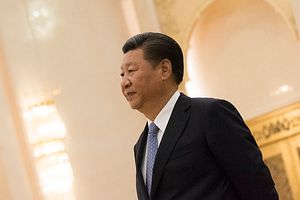Over a weekend, a Chinese Communist Party-authorized release in Chinese state media announced that the Party’s Central Committee would propose an amendment to China’s constitution at the upcoming National People’s Congress (NPC) to remove presidential term limits. That paves the road for Chinese President Xi Jinping to extend his leadership of China beyond 2023, when he would have been expected to step aside as president under current rules. The decision comes with days to go before the end of Xi’s first presidential term and the formal commencement of his second term, which would end in 2023. The full text of the proposal has been translated and is available at the always useful NPC Observer website.
The removal of term limits was long the topic of speculation in the lead-up to the 19th Party Congress and so when it was announced, one of the main causes for surprise was that the China-watching community had gotten a call right. (Prognosticating on the Party’s direction can be notoriously difficult from the outside.) The decision, while somewhat unsurprising, is nevertheless audacious. It marks an end to institutionalized leadership that was put in place under Deng Xiaoping and makes all the talk about the “rule of law” under the party at the 18th Party Congress’ fourth plenum somewhat quaint in retrospect.
At the 19th Party Congress last year, many China-watchers had already noted the clear lack of a successor to Xi Jinping among the members of the newly announced Politburo Standing Committee. Moreover, Xi’s massive anti-corruption campaign, veneration in state propaganda, and gradual accumulation of titles, including commander-in-chief of the People’s Liberation Army, has long signaled that he is no ordinary Chinese president in the mold of Hu Jintao or even Jiang Zemin.
Even before the elimination of term limits, the approval of the enshrining of his eponymous political theory — “Xi Jinping Thought on Socialism with Chinese Characteristics for a New Era” — at the 19th Party Congress indicated that as long as Xi remained alive and Mao and Deng, the only other two Chinese leaders with similar eponymous theories, remained dead, Xi would reign supreme.
In the days since Xinhua first publicized that the NPC would take up an amendment to the term limit provision, there is no real consensus among analysts over what the move may mean for China’s long-term trajectory. (For an excellent debate among Western scholars, see this roundtable from China File.) All agree that the move signals exceptional political strength in the persona of Xi Jinping, but disagree over how this may affect China’s long-term stability.
There’s the question too of why an open-ended term limit on the presidency is necessary. With an eponymous theory enshrined in the Chinese constitution, Xi should have been able to comfortably step down while maintaining immense factional strength within the Party apparatus for years as Jiang Zemin had done, for instance. (For a more maximalist approach than Jiang’s, Xi could have even held on to the titles of Party general-secretary and chairman of the powerful Central Military Commission.)
In the coming years, we’ll see what comes of Xi’s eager reversal of Deng’s institutionalization. Perhaps this is nothing more than a power grab by a power-hungry leader, paranoid at the prospect of his factional opponents getting the better of him and seizing the reins of the state and party apparatus absolutely to avoid succumbing to opposition. In this telling, Xi’s ascent is negatively correlated with the Party’s stability.
Or perhaps Xi really does see the absolute consolidation of power as a necessary evil to pursue major “reform” — helping China adapt to a 21st century model of sustainable economic growth and weaning the state-owned enterprise sector off easy leverage. In this telling, Xi’s dictatorial consolidation may just be necessary bitter medicine for a difficult transition from a rising China to the world’s next superpower.
What’s no doubt remarkable is that Xi has consolidated remarkable strength at a time when China is more powerful — in absolute and relative terms to the United States — than ever. With national rejuvenation and the “China dream” on his mind, Xi will be freer than ever to comprehensively leverage all elements of China’s state and society in defense of the country’s core interests.
All this may bode poorly for stability in and around the Asia-Pacific region, too. If the pessimists are correct and Xi’s determination to remain in office past 2023 reflects weakness, he may see fit to forcefully demonstrate to China’s nationalists that he is the one to restore the country to greatness by taking greater risks abroad.
It’s noteworthy too that the formal elimination of term limits comes at a time when the Trump administration has all but abandoned normative talking points with China at a high level, demonstrating to China that U.S. interest in democracy and the rule of law may have been a cynical tool to oppose the Chinese system all along, rather than a manifestation of closely held values. Where the United States could have once leveraged its democratic legitimacy to lay bare the pitfalls of Xi’s dictatorial consolidation, it is unlikely to do so under Trump, giving China the upper hand.
Whatever the trajectory from here for China, there’s no doubt that we’ll witness an important inflection point at the upcoming NPC. Only time will tell if we’ve just witnessed the end of the beginning of Xi Jinping’s rise, or if this is the beginning of the end, with the decision to remove term limits ultimately nothing more than Icarian overreach by a particularly ambitious leader.

































